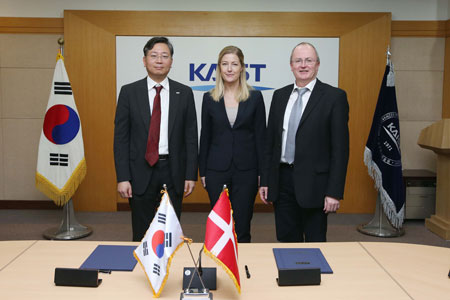DTU signs an agreement with KAIST—the leading technical university in South Korea—on a new, joint master's degree programme in telecommunications
Now, DTU students will have an additional option to travel to South Korea and do half of their MSc at South Korea's leading technical university, Korean Advanced Institute of Technology (KAIST). On 21 January 2015, DTU and KAIST will sign an agreement on yet another dual degree programme—this time in telecommunications.
A dual degree is a two-year MSc programme where a DTU student studies for two consecutive semesters at KAIST. Or vice versa: A KAIST student chooses to do two semesters at DTU. The student will achieve an MSc from both universities.

Associate Vice President, Prof. Changdong Yoo (KAIST), Sofie Carsten Nielsen, Minister for Higher Education and Science; and Senior Vice President and Dean Martin P. Bendsøe (DTU).
"It is a big advantage to the Danish business community and to the technological development that we have employees with specific knowledge of South Korea."
Sofie Carsten Nielsen, Danish Minister for Higher Education and Science
Minister heading Danish delegation
The agreement will be signed by Senior Vice President, Dean of Graduate Studies and International Affairs Martin P. Bendsøe at an official event at KAIST in connection with the visit of a Danish delegation headed by Sofie Carsten Nielsen, Minister for Higher Education and Science. The minister is pleased that DTU is expanding its partnership with KAIST:
"A study abroad matures, provides an international perspective, and new contacts. Therefore, it is the Danish government's goal that more students at higher education programmes have a period of study abroad—and in the technical area, South Korea is truly a country of inspiration for Denmark. Our collaboration with KAIST is helping to strengthen the already good relations between the two countries, and it is a big advantage to the Danish business community and to the technological development that we have employees with specific knowledge of South Korea," says Sofie Carsten Nielsen.
DTU established the collaboration with KAIST in 2008, and in addition to education, the partnership also includes e-learning, PhD programmes and research, among other things within green technology. In 2014, the partnership was expanded to include activities in the field of innovation and entrepreneurship.
Seventeen DTU departments out of 20 are involved in the KAIST partnership, and DTU's management has close relations with the KAIST management.
New programme addresses modern communication technology
The new dual degree within telecommunications is based on both universities’ strong, professional environment in the area. Telecommunications has become an integral part of important functions in modern society such as smartphones, social media, video streaming, banking applications, signalling systems and monitoring. The programme is tailored to meet the demand for engineers who understand the infrastructure behind these functions, and to maintain the existing systems as well as develop, design and dimension new ones.
Producing attractive engineers in Denmark and abroad
With the new agreement, DTU and KAIST are now collaborating on a total of eight MSc programmes. Dual degree programmes provide Danish engineering students with unique contacts in the South Korean research community and the companies out there," says Dean of Graduate Studies and International Affairs Martin P. Bendsøe:
"Engineering students from DTU get a foot inside the door to South Korea’s soaring technological developments, and they can use the contacts they establish in South Korea far into their future career. In addition, they acquire knowledge of a completely different culture, which is valuable to other Danish businesses who want to collaborate with Asia. This means that an engineer with a dual degree also is extremely attractive to the Danish labour market," says Martin P. Bendsøe.
In addition to the recently concluded dual degree agreement within telecommunications, the following dual degree programmes are currently in effect: